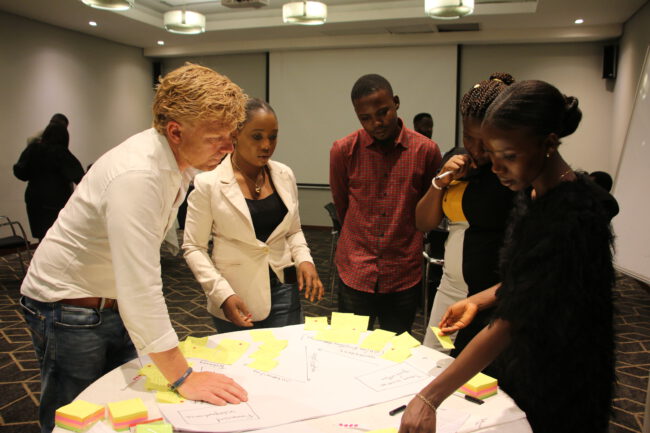Despite the evident potential of the digital economy to boost job growth and reduce the unemployment rate in Nigeria, it is yet to become a significant contributor to creating new jobs – especially for young women. Although our partners in Nigeria are making strides in generating digital jobs, they all face challenges in attracting women applicants.
CFYE collaborated with Proportion Global to investigate the root causes of this challenge and support the five companies in creating innovative solutions. Proportion ran a research and design sprint to determine the best ways to attract and recruit young women with the right background and have them commit to the programs. First, the design team and CFYE IPs came up with the overall design challenge: How might we get more young women into digital jobs?
Why was the research conducted?
Four Nigerian human-centred design experts of Proportion conducted field research for two consecutive weeks, primarily empathising with young women and their key influences (such as their spouses). Through key user profiles and empathy maps, the research team aimed to understand how candidates felt, thought, and what they said and heard. This resulted in a better understanding of women’s life experiences, motivations, barriers, influences, and expectations. The researchers also explored how women responded to the various phases of the user journey, such as the recruitment campaign, the onboarding process, on-the-job training, and job placement experience. This helped our implementing partners understand the key pain points of women applicants when interacting with their companies.
CFYE’s Nigerian IPs had different challenges depending on their business model, sector, and location. The challenges mentioned included the following:
- IP1: Women employees highlighted the need for more flexibility. For example, daily tasks instead of bi-weekly would help them cope with the workload better.
- IP 2: Misalignment between women’s aspirations and digital jobs.
- IP 3: Many women could not afford to acquire digital literacy skills.
- IP 4: Young women in Nigeria’s rural provinces found the IP headquarters too far to travel to for more information.
- IP 5: Many women did not have the proper program awareness and trust to apply to the program.
For each problem, the design team and the IPs formulated a company-specific design challenge they aimed to solve by the end of the sprint.
What happened in the design sprint?
The design sprint program was conducted in Lagos, where all five company teams actively worked on their solutions while learning and exchanging knowledge with other teams. After laying out their specific design challenge to be solved, the participants searched for inspirational case studies to generate solutions. This was followed by turning the most promising ideas into a more elaborate concept through storyboarding and role-playing. Finally, the teams built a tangible prototype and tested it with five users, reflecting on the user feedback and the initial design challenge articulated on day one. The teams closed off with pitch decks that captured all insights and learnings of the sprint.
“Women need to be empowered to see beyond their present situation and understand that there is a world of possibilities, especially in the digital space”.
– Folashade Owo, a young woman working as a Developer at one of CFYE’s Nigerian IPs
What were the results?
At the end of the design sprint, we were proud to see our partners having created diverse and innovative solutions to the overall design challenge of “how might we get more women into digital jobs?”
- IP 1 designed a digital app prototype that would allow women to pick their preferred mentor and schedule mentoring sessions at times that fit well with other household tasks.
- IP 2 created videos from current female employees who tell about a typical working day and show what type of digital tasks they need to complete to manage the expectations before people apply.
- IP 3 designed a discounted peer payment plan whereby young female applicants would get a discount if they applied with two or three women at once. This provides a discount and a peer learning experience to motivate each other.
- IP 4 designed a digital app prototype for their regional outlet managers, providing access to frequently asked questions from applicants and customers and a direct chat function with senior staff at headquarters, empowering them to respond better to young women in their community.
- IP 5 designed customised flyers in various local languages, making local applicants feel more heard and understood, resulting in a higher level of trust to engage with the company.
Through five days of learning, brainstorming, and creating, our Nigerian partners were able to develop solutions that were responsive to women’s needs and removed the roadblocks holding women back from entering digital work. We want to thank Proportion for leading this design sprint.
CFYE is committed to promoting a future of work that is inclusive, decent, and sustainable. Digital platforms can highly contribute to achieving this ambition. We are continuously learning about digital jobs, what challenges and opportunities they bring, and how African youth can benefit from them. Check out our Future of Work: Digitally-Enabled Jobs page to explore the topic more.
